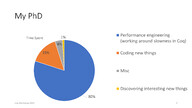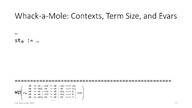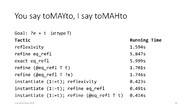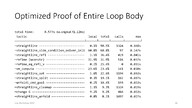 | EasyChair Smart Slide | User Guide/Log in |
| Home |

In most programming languages, asymptotic performance issues can almost always be explained by reference to the algorithm being implemented. At most, the standard asymptotic performance of explicitly used operations on chosen data structures must be considered. Even the constant factors in performance bottlenecks can often be explained without reference to the implementation of the interpreter, compiler, nor underlying machine.
In 10+ years of working with Coq, we (Jason, Andres, and our colleagues) have found this pattern, which holds across multiple programming languages, to be the exception rather than the rule in Coq! This turns performant proof engineering, especially performant proof automation engineering, from straightforward science into unpredictable and fragile guesswork.
By presenting in detail a sampling of examples, we propose a defense of the thesis: Performance bottlenecks in proof automation almost always result from inefficiencies in parts of the system which are conceptually distant from the theorem being proven. Said another way, *debugging, understanding, and fixing performance bottlenecks in automated proofs almost always requires extensive knowledge of the proof engine, and almost never requires any domain-specific knowledge of the theorem being proven*. Further, there is no clear direction of improvement: We know of no systematic proposal, nor even folklore among experts, of what primitives and performance characteristics are sufficient for a performant proof engine.
We hope to start a discussion on the obvious corollary of this thesis: *This should not be!*
Our presentation, we hope, will serve as a call for a POPLMark for Proof Engines, a call for designing and implementing an adequate proof engine for *scalable performant modular proof automation*.


















































